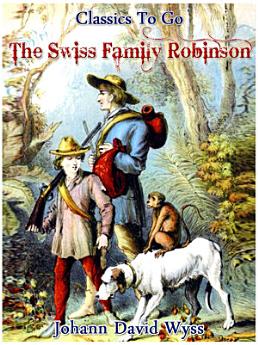Swiss Family Robinson
Johann David Wyss
дец 2015. · Otbebookpublishing
E-knjiga
405
Stranica
family_home
Ispunjava uslove
info
reportOcene i recenzije nisu verifikovane Saznajte više
O ovoj e-knjizi
The novel opens with the family in the hold of a sailing ship, weathering a great storm. The ship runs aground on a reef, and the family learns the ship's crew has taken to a lifeboat and abandoned them. Subsequent searches for the crew yield no trace. The ship survives the night, and the family finds themselves within sight of a tropical island. The ship's cargo of livestock, dogs, guns & powder, carpentry tools, books, a disassembled pinnace, and provisions have survived. The family builds a raft, lashes livestock and the most valuable supplies to it, and paddles to the island, where they set up a temporary shelter. Over the next few weeks they make several expeditions back to the ship, to empty its hold, and harvest rigging, planks, and sails. They construct a small homestead on the island, and the ship's hull eventually breaks up in a storm and founders. The middle of the book is a series of vignettes, covering several years. The father and older boys explore various environments about the island, discover various (improbable) plants and animals, and build a large tree house, complete with a library. They also use the carpentry tools and local resources to build mechanical contraptions. Eventually, sailing the pinnace around the island's coast, they discover a European family hiding from local pirates. They adopt their daughter (who at first masquerades as a boy), and her father returns on a rescue mission, restoring the family's contact to the outside world. (Excerpt from Wikipedia)
O autoru
Johann David Wyss (1743-1818) was a Swiss pastor and author whose life and work offer a fascinating glimpse into the Enlightenment era's intersection of faith, education, and literature. Born in Bern, Switzerland, Wyss was deeply influenced by the intellectual currents of his time, which emphasized reason, scientific inquiry, and a return to nature. As a pastor, he was committed to the moral and educational development of his congregation, often using storytelling as a means to impart ethical lessons.Wyss's literary contributions extend beyond his pastoral duties. He was an ardent advocate for practical education, believing that learning should be both instructive and engaging. This philosophy is evident in his didactic approach to writing, where he seamlessly blended adventure with moral instruction. His works often reflect his admiration for the natural world and his belief in the importance of self-reliance, virtues that resonated with the burgeoning Romantic movement.Intriguingly, Wyss's influence reached far beyond his native Switzerland. His ideas about education and morality found a receptive audience among contemporary writers and educators, who appreciated his innovative approach to storytelling. Despite his relatively modest literary output, Wyss's legacy endures, particularly in the way he championed the integration of practical skills and ethical teachings in literature.Wyss's life was not without controversy. His progressive views on education occasionally clashed with more conservative elements within the church and society. Nonetheless, his commitment to nurturing a well-rounded, morally grounded individual left an indelible mark on the literary and educational landscapes of his time.
Ocenite ovu e-knjigu
Javite nam svoje mišljenje.
Informacije o čitanju
Pametni telefoni i tableti
Instalirajte aplikaciju Google Play knjige za Android i iPad/iPhone. Automatski se sinhronizuje sa nalogom i omogućava vam da čitate onlajn i oflajn gde god da se nalazite.
Laptopovi i računari
Možete da slušate audio-knjige kupljene na Google Play-u pomoću veb-pregledača na računaru.
E-čitači i drugi uređaji
Da biste čitali na uređajima koje koriste e-mastilo, kao što su Kobo e-čitači, treba da preuzmete fajl i prenesete ga na uređaj. Pratite detaljna uputstva iz centra za pomoć da biste preneli fajlove u podržane e-čitače.








